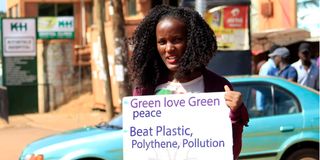Gates Foundation fetes four women for driving SDGs

Uganda's Vanessa Nakate bagged the Campaign Award for her campaign that highlighted the disproportionate impacts of climate change for women and girls in Africa.
What you need to know:
- The Bill and Melinda Gates Foundation has feted the four leaders for their inspiring efforts to drive progress for all.
- Ugandan climate activist Vanessa Nakate ran a campaign that highlighted the disproportionate impacts of climate change for women and girls in Africa.
- Indian doctor Radhika Batra received the Progress Award for advancing SDG 3 and SDG 10.
The Bill and Melinda Gates Foundation has feted four women change makers for their role in advancing the Sustainable Development Goals (SDGs).
Ugandan climate activist Vanessa Nakate, Indian doctor Radhika Batra, Afghan journalist Zahra Joya and president of the European Commission (EU) Ursula von der Leyen of Germany, were announced as the winners of the annual Goalkeepers Global Goals Awards.
In a press statement on September 20, head of Goalkeepers, Blessing Omakwu, observed that they had demonstrated how women were leading the way in coming up with innovative solutions to better their communities and humankind.
“While the world is far from being on track to reach the Global Goals by 2030, there is still cause for optimism. We have seen how human ingenuity and innovation can lead to game-changing breakthroughs and progress toward our shared goals. And that is exactly what we see in this year’s winners,” said Ms Omakwu.
The 2022 Global Goalkeeper Award was received by Ms Von der Leyen. She showed determination in leading both the EU and the global response to the Covid-19 pandemic.

President of the European Commission Ursula von der Leyen. She led the efforts of the EU to support lower-income countries in responding to and recovering from Covid-19.
A champion of global health and equitable access, she led the efforts of the EU to support lower-income countries in responding to and recovering from the pandemic.
In June 2020, she announced a new EU’s contribution of €300 million to the Vaccine Alliance Gavi, which is more than the sum of all previous contributions.
Ms Nakate bagged the Campaign Award.
Through her Rise Up Climate Movement and Green Schools Project, she has advanced SDG 4: Education, SDG 5: Gender Equality, SDG 10: Reduced Inequalities, and SDG 13: Climate Action.
She ran a campaign that highlighted the disproportionate impacts of climate change for women and girls in Africa while amplifying the voices of activists from across the world. She also addressed energy and poverty in rural schools in Uganda using economical and sustainable solutions to equip 24,000 schools with solar panels and eco stoves.
The Change maker Award was presented to Ms Joya. She progressed SDG 5: Gender Equality, and SDG 16: Peace Justice and Strong Institutions by inspiring change using a position of leadership.
Reduced inequalities
She used her online news agency Rukhshana Media, which focuses exclusively on covering issues that affect the women of Afghanistan to ensure their stories were reported on and reached the wider public.
Ms Batra received the Progress Award for advancing SDG 3: Good Health and Well-Being, and SDG 10: Reduced Inequalities via her business initiative.
With her organisation Every Infant Matters, she tackled health inequalities by providing last-mile health solutions to disadvantaged children in the slums of New Delhi.
Since 2017, she has saved more than 70,000 children from blindness. Additionally, she has provided education to prevent gender inequality and the stigma of tuberculosis, HIV/Aids, and blindness to more than 65,000 families.
The announcement of the award winners followed last week’s release of the sixth annual Goalkeepers Report, “The Future of Progress,” co-authored by Bill Gates and Melinda French Gates. They call for new approaches to achieving gender equality and food security in the wake of overlapping global crises. They cite the dramatic progress in dealing with the HIV/Aids epidemic — a nearly 60 per cent decline in annual deaths between 2000 and 2020 — as an example of what can happen when the world invests in long-term solutions and innovative approaches to entrenched issues.





